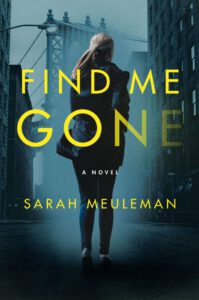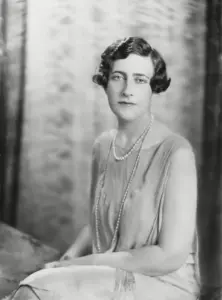Booktrib
An Unusual Journey of Bringing Art to Life – by Neil Nyren
 FIND ME GONE is an unusual novel in many respects — its story, its author, and the creation of the book itself.
FIND ME GONE is an unusual novel in many respects — its story, its author, and the creation of the book itself.
Belgian author Sarah Meuleman says it is the sum of everything she has been and done in her life: a singer-songwriter, a journalist, a television host, a writer, and managing editor at Vogue magazine.
“I used to sing [her album More Than Meets the I, under the name SAM, was released in 2003], and sound is pivotal to me: how sentences flow, rumble, and roll,” she says. “My background in journalism strengthens me in weaving the story, and the acting and presenting helps tremendously with writing dialogue. I feel that each sidestep I’ve ever made has added significantly to the thing I love doing most: writing.”
But even with the writing, she has continued to take sidesteps.
The history of FIND ME GONE is a case in point. It was first published in Belgium in 2015, and received praise and an awards nomination, but then the next year, she “remixed” the book and published a new version of it with a different title. Why did she do that and what version are we reading now?
“This is an important point for me,” she says. “Look at art these days: it’s very much alive. Songs are being mixed and remixed, works of art constantly evolve, a play is never the same on the last performance as it is on opening night. I think this dynamic is at the heart of what art is about. But when I look at literature, I don’t see that dynamic. When a writer delivers her novel, the work is usually done. The book is printed, shelved, and will remain the same forever. But you can tell every story in so many different ways; we do it all the time when we share stories with friends. Not one version is the same, so why would books be obliged to freeze in time?
“By ‘remixing’ my novel, I wanted to call for more playfulness and dynamics in contemporary literature. When my book went into a second printing, I decided not to tell a different story, but to tell the same story slightly differently. It’s not a completely new idea, of course. Vladimir Nabokov always kept changing and tweaking his novels. He said, ‘My pencils will outlast their erasers.’
“FIND ME GONE is in fact the third version of this story. I combined the two earlier versions and added new chapters in English. This is not simply a translation – I have reworked the novel – and for me, the English version is the ultimate one. For now.”
The novel itself is haunting, emotional, a story filled with secrets. In a small Belgian town in 1996, two twelve-year-old girls, Hannah and Sophie, are inseparable, all the more so because that summer, girls start disappearing. And then it is Sophie’s turn. After a school dance, she fails to return home, and is never seen again.
Eighteen years later, Hannah is living in New York City, a successful columnist for a fashion magazine, but restless, adrift, and still obsessed with disappearances. Fed up with writing about the “It girls and the perfect parties,” she quits her job to write a book about three women who fascinate her, all writers, all who vanished: Agatha Christie, who went missing for 11 days in 1926 at the height of her success, and never spoke about it to anyone; Barbara Newhall Follett, an American prodigy whose novels at the ages of 12 and 14 became sensations, but who, at 25, left her house in Brookline, Massachusetts, one day and was never seen again; and Virginia Woolf, 59, filling her pockets with stones and walking into the river.
 “Talented, wise women who raised their voices and then suddenly became silent. Why?” Hannah wonders. But the things she ends up exploring, the things she discovers, force her to confront the questions and memories she has suppressed for so long.
“Talented, wise women who raised their voices and then suddenly became silent. Why?” Hannah wonders. But the things she ends up exploring, the things she discovers, force her to confront the questions and memories she has suppressed for so long.
What happened to Sophie? The answer will come as a shock. Whatever you think is the truth – you’re wrong.
As Hannah pursues the research, her three subjects themselves, as seen through Hannah’s eyes, become living characters in the story. How did the author become interested in these women? Did she herself feel a special kinship?
“As a child, I used to read everything there was in the house, and when I had finished reading all my books, I used to sneak into my parents’ bedroom to steal books from their shelves. My mother loved Agatha Christie. My father is an avid Stephen King fan. I must have been ten when I read their books. Later, I was completely mesmerized by Virginia Woolf, her writing and her person. When I discovered Barbara Follett, she inspired me: so very young and talented, completely in love with words.
“I noticed that I mirror myself in the writers I love, comparing their ways, habits, stories to mine, often using them as an inspiration. But then I thought: who am I to presume I know anything about them? Am I not simply reducing these great women to ‘flat characters’ sticking their lives onto mine, as Hannah describes it in FIND ME GONE: ‘click, drag, drop?’
“I decided to use this fascination in my novel; this tender line between ‘real’ authors and how my main character Hannah draws on them to solve the mystery of her best friend Sophie.”
Meuleman also learned a bit about the writing processes of the three women, and these exerted their own influence on her, even while she crafted her own.
 “Agatha used to talk to herself and tell herself stories out loud during long walks on the English moors. In my case, it’s a little more prosaic. I usually sit somewhere in the back of a café with a cappuccino and quietly mumble the lines of a scene behind a laptop,” she says.
“Agatha used to talk to herself and tell herself stories out loud during long walks on the English moors. In my case, it’s a little more prosaic. I usually sit somewhere in the back of a café with a cappuccino and quietly mumble the lines of a scene behind a laptop,” she says.
“I’m tremendously inspired by music. I love to write scenes with my headphones on, choosing a specific track to accompany the scene and then playing it on repeat. I can listen to one particular song again and again and again, for an hour or as much as it takes to get the scene finished. It’s a dreamlike state.
“As for the story of Hannah and Sophie itself, it was there before I started writing it down. I love creating tension and twists, but a truly suspenseful novel with a believable yet unexpected twist demands a lot of plotting and discipline. Suspense is such a delicate balance. You continuously need to ‘see’ the story through the eyes of your reader — where do you leave her guessing, where do you plant a clue?”
The creation of that writing process even extended to the chapter titles of her novel, all of which are titles of movies, songs, or books.
“I wanted them to be more than just informative ‘road signs’ in the novel,” she says. “I wanted the words to convey a certain mood in just a few words, and what better to use than titles of familiar movies and songs? When I say to you ‘Candle in the Wind,’ these four words tell you so much more and convey more meaning and feelings than perhaps ten pages of text could.”
How much of Hannah and Sophie are in Meuleman herself?
“I was born in a seaside town in Belgium and lived in a village close to Bachte-Maria-Leerne, where FIND ME GONE is partly set. Just like Hannah and Sophie, I attended a girls’ school and was taught by nuns, which must make it sound like I’m seventy years old. In fact, in Belgium, tradition is important and the tradition of girls’ schools and uniforms lasted for a very long time. I walked around in a dark green uniform for eleven years and I guess that’s the reason I still don’t wear green to this day.”
What about the fashion magazine Hannah quits in disgust? Has Meuleman herself felt that way? Another sidestep.
She hosts a television documentary show: Sarah’s Savages.
“It’s an art show that focuses not only on the work of art, but also on the artist,” she says. “I traveled from India to France to America and many other countries, where I was welcomed by the artists in their homes and their families. With this show, we wanted to break the barriers people sometimes feel when they think of modern art. Art is not hard or complicated! It’s the work of a person, using her imagination to create something beautiful or meaningful. And I’ve met so many beautiful and inspiring people during the show.”
That sentiment extends to the people she’s met along the way in publishing.
“I think the success of every new author starts with someone believing in you,” she says. “Writing may be an activity you do alone, and, yes, it can be really lonely sometimes, but getting a book ‘out there’ is something you do as a team. I’ve been very fortunate that my literary agent Cecile Barendsma of Cecile B Literary Agency ‘discovered’ the book and recognized its potential. And then my editor Laura Brown of HarperCollins signed the book, and FIND ME GONE’s journey began. I worked closely with Laura on the English version, and now the wonderful and resourceful team of Harper Perennial is launching the book.
“It can be really daunting as a new author to get your debut novel out there, especially when you’re from a tiny country like Belgium. But, so far, the response has been incredible.”
Her next book is also a suspense novel, set this time on a mysterious group of islands. As with FIND ME GONE, it’s structured in brief, fast-paced chapters, “and it will have twists and an edge, but that’s all I can tell you now!”
One thing seems certain, though. No matter what steps, or sidesteps, she takes, this is one writer who will not disappear.
Author’s portrait by Yvette Kulkens Photography
Crimereads
Sarah Meuleman and the Vanishing Writers – by Lili Meyer
 In Sarah Meuleman’s debut novel it’s all about vanishing women. Ten, actually. I spoke with the author about best friends, disappearances, and the specter of violence. Like Hannah herself, she ranged through a wide variety of cultural worlds, invoking Agatha Christie, Nabokov, and the Kardashians.
In Sarah Meuleman’s debut novel it’s all about vanishing women. Ten, actually. I spoke with the author about best friends, disappearances, and the specter of violence. Like Hannah herself, she ranged through a wide variety of cultural worlds, invoking Agatha Christie, Nabokov, and the Kardashians.
Lily Meyer: What are your most powerful memories of adolescent friendship, and how did they inform Hannah and Sophie’s relationship?
Sarah Meuleman: Like Hannah and Sophie, I attended a Belgian Catholic girls’ school and wore a dark green uniform. It was a strange affair to be living in a very modern society, singing all the Madonna and No Doubt pop songs, and at the same time being so separated from boys most of the time. The way that pupils divided themselves into pairs, in close friendships that bordered on romantic relationships, was something I have personally experienced and had never really read about. I wanted to describe that special sort of attachment in this novel.
LM: What was the first seed of Find Me Gone? Did it begin with the girls’ friendship, the idea of Hannah’s book, or something entirely different?
SM: First, there was the friendship. Two very different girls, finding each other, being close as young children can be, with a complete trust and confidence in each other. Then one of them begins falling in love. What happens next? It feels so unfair to Sophie, who relies for her safety on her best friend.
LM: Then where did Hannah’s book come from? How did you weave the novel’s sections—Hannah’s past and present, and the three writers’ lives—together?
SM: I find it interesting how easily we are shaped and inspired by the lives and stories of people we have never even met. We presume to know artists and celebrities through watching them on TV or reading about them. Hannah looks for guidance in the lives of these famous writers, wanting to solve something in her own past through the stories and ideas of Agatha Christie, Barbara Follett and Virginia Woolf. I wanted to weave the lives of these writers through Hannah’s life, which meant that the writers became characters in my book.
LM: Have you ever wanted to write a book about Christie, Follett, and Woolf yourself?
SM: I’m very fascinated by disappearances and this will probably not be my last book about a person who vanishes. However, I would never want to write a biography, like Hannah does. For me, the most important aspect of writing about other writers isn’t the biographical facts, but the question: what do we look for in ourselves when we take the time to dive into the lives of others? Why are we so fascinated by the Kardashians? Why do we take the time to read any biography? I think we look to discover things about ourselves, or even change them, through other people’s stories. Personally, I feel more able to explore this idea in fiction, though I incorporated it in Find Me Gone by bringing Christie, Follett and Woolf back to life.
LM: As a writer, what’s your relationship with Agatha Christie’s work?
SM: Agatha Christie is a love affair for me. I started reading at an early age, and when I was about ten and had read all the books in my bedroom, I snuck into my parents’ room to take their books. There I discovered my mother’s Agatha Christies. Christie was my first step from the world of Roald Dahl into adult literature. What a discovery! Perhaps the sneakiness of stealing the book from my parents’ bedroom added to the momentum. My father, by the way, happens to be an avid Stephen King fan, and after reading the Christies, I went straight to King. I’m sure the more gruesome aspects of my books are the responsibility of my father’s reading tastes.
Today, there are still few things that can relax me as much as re-reading one of those Agatha Christies. What I especially admire about Christie is her ability to plot. It’s a very specific art, creating a watertight, convincing, yet surprising plot. In all honesty, it can be a terribly frustrating thing to do. The element of surprise was especially important to me in Find Me Gone. When I read Christie biographies during my research for the book, I could totally identify with her struggles to plant just the right clues, and figure out the right twists and storylines. It’s torture, but of the most rewarding kind.
LM: Before your Agatha disappears, she thinks, “The truth does not matter when she is writing”—is that true for you?
SM: I like it that you say: “your Agatha” because in a way she is mine, and she’s also Hannah’s Agatha. Yes, this is something I truly sense when I’m writing: the truth doesn’t matter. At least, not as long as my fingertips are moving across the keyboard. When I’m behind my laptop, I’m in another universe, my characters are the real characters, and what they experience, I experience. It’s a lie, I know. But the truth, the world outside the writing, the real world, doesn’t matter at that moment. It’s quite an intense state of being. My boyfriend often has to drag me out of the zone and remind me that there’s a real world, with real appointments to keep and real dishes to wash. He summons me to stop, not unlike Archie does for Agatha. Once I’m really into a story, I don’t want to stop.
LM: Find Me Gone is clearly a novel about gender; in nearly every chapter there’s a moment when a character has to choose between conventional femininity and what makes her happy, or when she finds herself forced to submit to a man’s control. In what ways did you set out to explore a particularly female experience?
SM: If you talk about sex, it’s inevitable to talk about gender and power. I deliberately wanted to write about how Hannah and Sophie, two girls in the nineties, find themselves in the middle of a country in turmoil because of a sexual scandal at the exact moment when they begin exploring their own sexuality at the same time. I wanted to show how Hannah and Sophie deal with that sexuality in their individual ways.
LM: Would you say that Find Me Gone is about sexual abuse, or not? What is the difference between writing about abuse and writing about the threat of abuse?
SM: What’s the difference between a woman feeling harassed and a woman being harassed? It’s a terribly complicated and very topical question. To me it’s not about the abuse, it’s all about power versus freedom. I think all of the women in Find Me Gone would love to feel and be free. They are not exclusively limited in their freedom by men; they limit themselves too, as we all do. That’s why it would be a shame to talk about the book only through a gendered lens. To me, the book is not just about women struggling; it’s about people struggling.
LM: You wrote two versions of this novel in Dutch—what were the changes you made, and why did they feel necessary?
SM: The rewriting of the first version was actually a playful plea. Literature is still a bit stiff, I think, compared to the other arts. In music you get constant remixes, in theatre a play is never the same from one series of performances to the next. But literature… You finish a book and that’s it! The book is ready, shelved, the writing set in stone. I wanted to shake that up. So, using all the thoughts and ideas that had been going through my mind after the release of the novel, I created a new version. Maybe it’s just my way of saying that literature can be dynamic and a novel is never finished. Author Vladimir Nabokov rewrote many of his novels and he described the process beautifully. “My pencils,” he said, “will always outlast their erasers.” I hope mine will too.
Author’s portrait by Yvette Kulkens Photography
VOGUE
Finally Unfaithful – by Claudia Ruigendijk
 Writing is in her DNA. Sarah Meuleman combined her busy work as an editor and interviewer for Vogue with writing her first novel, Find Me Gone, a mysterious story that takes you from the Flemish countryside of the Dutroux era to London during WW1 and back to contemporary New York.
Writing is in her DNA. Sarah Meuleman combined her busy work as an editor and interviewer for Vogue with writing her first novel, Find Me Gone, a mysterious story that takes you from the Flemish countryside of the Dutroux era to London during WW1 and back to contemporary New York.
Hannah and Sophie, two twelve year-old friends from the Flemish countryside, share every secret. Until the moment Sophie does not return from a party. Eighteen years later Hannah works as a successful journalist in New York, when she decides to leave everything behind to write a ‘biography’ about Agatha Christie, a women who, like her friend Sophie, one day disappeared into thin air. In her search for the answer to the mysterious disappearance of Agatha Christie, Hannah gets closer to answering that question from her past she has tried hard to forget: what happened to Sophie, that fatal night in 1996?
Are you fascinated by disappearances?
I am, in the broadest sense of the word. All of us are constantly alternating between remaining in the background and looking for the limelight, just like Christie and like my protagonist Hannah, who, against all odds, gives up her fame and career to write a biography.
How did you come up with the idea for the book?
It had been on my mind for a long time to write this book, and the story developed throughout those years. It came from my admiration for Agatha, a fascination for Flanders where I grew up, the energy of New York, powerful women and so much more. It’s not an autobiography, it’s fiction. But the scenes with Agatha Christie – who becomes a character in my book – are based on her biography. You feel for Agatha, when she struggles to connect with her daughter Rosalind, or when she is abandoned by Archie, the husband she adored.
You are a journalist by trade. What was it like to write a novel?
As a journalist you have to stick to the truth, not now. Finally! If I say my character has cascading blonde hair, then she does. Period. It felt magical. I also found it gratifying to figure out a plot, although I felt quite frustrated at times. All the pieces have to fit.
Apart from Agatha, where did you get your inspiration?
Series, I have seen so many: The Killing, House of Cards, Mad Men. It’s interesting to look beyond the storyline and see how these series are constructed. How do you create suspense, how do you make the very most of a scene?
Can we expect another novel soon?
I have an idea for my next novel and I am about to begin. One thing I have learned writing this book: there is never a good time to start writing because it’s so much work and you can find so many excuses. But in the end the best moment is always now.